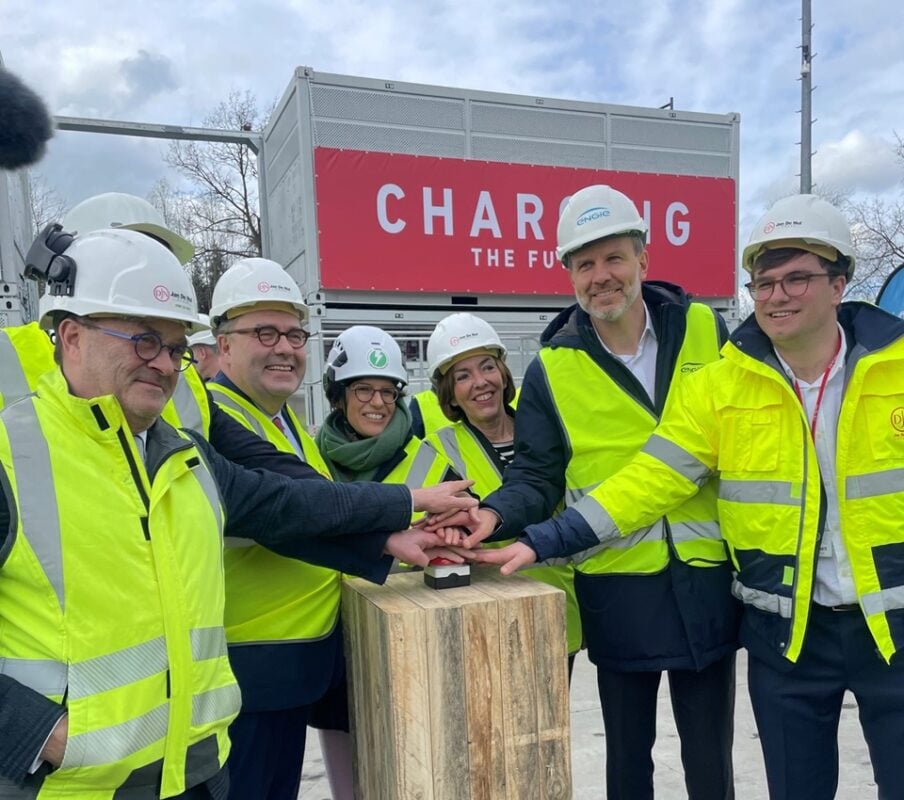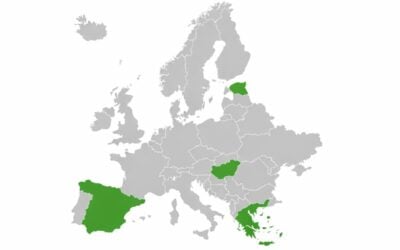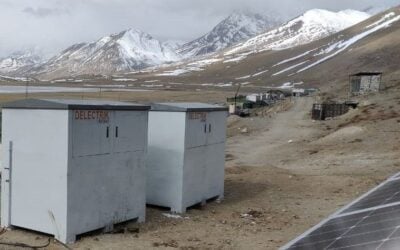
Belgium’s energy minister visited the site of a large-scale lithium-ion (Li-ion) battery storage project, a few days after attending the inauguration of a vanadium flow battery system.
Government minister Tinne Van Straeten visited TotalEnergies’ refinery and petrochemicals platform complex in Antwerp, where the French multinational has developed its first battery energy storage system (BESS) in Belgium.
The 25MW/75MWh Li-ion project is due for completion by the end of this year, with 40 containerised BESS solutions provided by battery manufacturer and storage system integrator Saft, owned by TotalEnergies.
It is the energy company’s largest battery project in Europe to date, and TotalEnergies used the occasion of the minister’s visit to announce a second project of equal sizing and capacity in the country, roughly a year after the Antwerp refinery project was announced.
Try Premium for just $1
- Full premium access for the first month at only $1
- Converts to an annual rate after 30 days unless cancelled
- Cancel anytime during the trial period
Premium Benefits
- Expert industry analysis and interviews
- Digital access to PV Tech Power journal
- Exclusive event discounts
Or get the full Premium subscription right away
Or continue reading this article for free
Also being deployed at one of TotalEnergies’ petrochemicals refineries, this time in Fuloy, Wallonia province, the project will again have a power rating of 25MW to 75MW capacity, for a 3-hour duration. As with the Antwerp project, Saft’s Intensium Max High-Energy BESS solution will be used.
The company claimed the two projects represent a total investment of about €70 million (US$75.43 million), with the Fuloy project expected to go into commercial operation by the end of 2025.
TotalEnergies aims to develop 5GW of its own battery storage projects globally by 2030. It has already delivered four projects in France which were awarded 129MW of ancillary services contracts from the grid operator RTE.
As with the two new projects in Belgium, TotalEnergie’s French BESS sites are all located at various refineries and platforms the company owns and operates, benefiting from available land and perhaps more importantly, grid connections.
In January, TotalEnergies acquired German BESS developer Kyon Energy, for €90 million (US$98 million) upfront, plus further payments linked to development targets, while a few months back in October, the French company switched on a 255MWh Saft BESS at a solar PV plant in Texas, US.
Within Belgium, TotalEnergies has a combined cycle gas turbine (CCGT) power plant, a pumped hydro energy storage (PHES) plant and an offshore wind farm, while it is also developing further wind plants and solar PV projects.
Belgium is becoming a market that represents good opportunities for battery storage assets, due to its congested grid with a rising share of renewable energy. In an Energy-Storage.news webinar to be hosted tomorrow (4 April) with consultancy Clean Horizon, Bart Pyke of Belgian route-to-market optimiser Yuso will discuss the business case and fundamental drivers for storage in the country’s energy markets.
VRFB inauguration at industrial site
Last week (27 March), minister Van Straeten was at the inauguration of a 0.8MWh vanadium redox flow battery (VRFB) system co-located with a 0.6MW solar PV array at an industrial site in the East Flanders city of Aalst.
Provided by Anglo-American flow battery tech company Invinity Energy Systems in partnership with the Belgian subsidiary of another French multinational, ENGIE, and energy and technical services firm EQUANS, the flow battery is installed at the headquarters of Jan De Nul, a civil engineering firm.
ENGIE’s energy management system (EMS) will control the batteries as they store energy generated from the onsite solar PV for use in the evenings. Invinity said it, ENGIE and EQUANS hope to use the project to better understand how flow battery technology could be used at such sites as an alternative to Li-ion.
Currently, Belgium’s two biggest battery storage systems are a 50MW/100MWh system in Wallonia from French developer Corsica Sole, and a 25MW/100MWh system in Ruien by a Nippon Koei-Aquila Clean Energy joint venture.
Minister Van Straeten also attended the inauguration of the Ruien project, which is optimised by Yuso.
In November last year, Belgium’s grid operator Elia awarded 15-year Capacity Remuneration Mechanism (CRM) contracts to 357MW of new-build BESS projects. Those capacity market contracts are thought to represent a relatively small portion of the revenue stack available to BESS assets in the country, but offer long-term revenue certainty, while other applications include the lucrative frequency control reserve (FCR) and secondary reserve ancillary services products.





